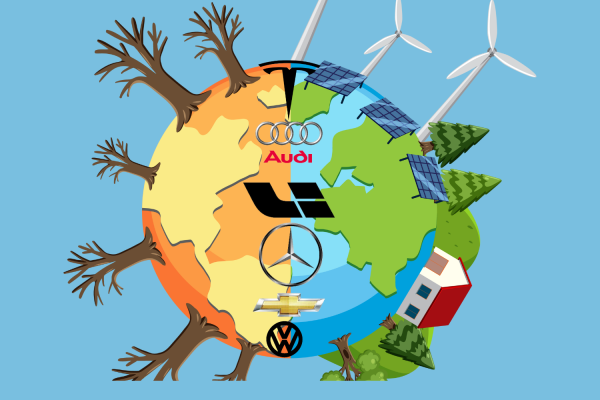EV’s Growth In The Auto Industry
Ever since cars like the Toyota Prius came out in the early 2000s, the North American car market has had its eye on shifting towards a more “green” industry. With the increase in electric vehicles (EVs), brands like Lucid, Li Auto, and Tesla have thrusted themselves into the lucrative car market in North America. Many established car manufacturers have increased their spending in this field, which has sparked many positive discussions about what can be done about the state of the environment. It has also made many people start to think about their carbon footprint and what they can do to improve it. But this rapid growth of EVs has also caused a new dark side of the industry to emerge, which could be doing more harm than good.
Cobalt, Lithium, and Manganese Mining: The Blood Diamonds of The Auto Industry
The production of EV batteries has been looked down upon for its harsh environmental effects. But in the last couple of years, the environmental effects it creates have been highlighted by mainstream media. Cobalt being a pivotal part of an EV’s battery, has caused auto manufacturers to obtain this precious resource in ways that negatively affect our environment. These cobalt mines produce toxic residue that poisons groundwater, and their fumes contain sulfur and other pollutants that damage the environment and nearby communities. These harmful conditions take a significant toll on the individuals who are forced to mine for these materials, they are underpaid and not given the right equipment or training. Some of these auto-makers are even enabling the continuation of child labor which can be seen in the mining of cobalt.
Manganese batteries are similar to cobalt batteries in their harmful environmental impact on nearby soil and water. These mines are typically in dry landscapes, which causes the high amount of dust in the air to be polluted and spread around the area. This pollution can harshly affect people within these communities, According to an article from SOMO News, “The increased demand for manganese for batteries is posing a serious threat to local communities, with women and girls most at risk from rights abuses, including severe health conditions such as asbestos poisoning and tuberculosis, and exploitation.”
Finally, lithium’s impact comes from its extraction process, which includes evaporating water that lithium is placed in to extract all its raw properties. This process deprives local communities of safe drinking water, and the water that is safe to use is typically taken for use in these mines.
Paywalls: Monopolizing The Use of Your Car
As the technology of EVs grows, there has been a dangerous increase in different paywalls where more EV owners are having car features like engine performance, car maintenance, and features that are seen as industry standards outside the sphere of EVs. These paywalls are easy to create for car manufacturers because of the programmable nature of these cars. Most recently, Mercedes has subjected their consumers to these paywalls by having to pay a yearly or monthly fee for better performance.
A writer for the Verge, Umar Shakir, said in an article on the matter, “The automaker is also letting you pay a one-time fee of $1,950 on the EQE and $2,950 on the EQS to unlock the Acceleration Increase permanently.”
One could opt to pay a monthly fee instead and would have to keep up on their payments to the automaker or have the performance of their car substantially decrease. Although at first glance, this idea of paying for a faster car makes sense, the idea is immediately drowned out because Mercedes is even applying this paywall to their AMG line of cars, which is their high-performance line. This troubling trend isn’t just exclusive to Mercedes. Brands like Tesla were one of the first to adopt this new method by having most features of their EVs as payable add-ons, even having the full use of the battery that the customer pays for as a feature that needs to be unlocked.
As well as features of EVs being locked away from the buyer, the maintenance of the cars is also locked. Due to many EV programming, some features locked away from the driver also disallow them from fixing their own car or going to a non-dealership auto shop.
Do the Negatives Outweigh the Positives?
As the affairs of auto manufacturers continue to be covered up, the positive effect of EVs may not be seen for quite some time. Although the market that has been created will never go away, there are still different areas of EVs that need to be reformed to ensure these cars do good for the environment. Some automotive companies have already taken steps forward in changing where they get their raw resources from or promising to lower the production gap between EVs and gas-powered vehicles. But unfortunately, many of these issues are deeply rooted in layers of human rights violations, lies, and nefarious behavior. Overall, the production of these EVs will take longer than anticipated to yield a positive impact on the environment.
This sparks the question about how rich you have to be to try and make a difference in our environment, especially if these are the cars of the future, there needs to be some initiative made to allow people of lower income to afford these cars.
Do EVs Spark Classism?
These factors surrounding EVs and their paywalls suggest that they aren’t getting any cheaper for consumers to buy and maintain. Business Insider Money.com interviewed Joseph McCabe, president of AutoForecast Solutions and he said “EVs usually cost at least $10,000 more than their comparable gas counterparts.”
But because of the ethos surrounding EVs and their supply and demand, pushes EVs into this upper echelon of cars that only some people can afford. The physiology behind EVs also feeds into the classism created by owning one of these electric cars. A study by Medium written by Sam Nattress, highlights how EV brand marketing has placed guilt on the consumer rather than the brand. Nestress said, “On issues like climate change, which are complicated, time-sensitive, and crucial, the worst thing about guilting is that it will never convince anyone to change their behaviors.”
These campaigns include rhetoric that labels the consumer as the only one who can make a difference by being able to afford these cars. Taking the blame away from any brand and purposely putting this guilt into the hands of the consumer. Of course, there are increasing problems when it comes to the monetary sacrifice to maintain an EV but this classism is rooted in the harmful rhetoric of EVs and their ad campaigns.

Are Some Brands Making a Difference?
Although there are a handful of EV-only brands in the car market. The brands that take advantage of this portion of the automotive industry are already established car brands that have in recent years expanded their EV programs. Automaker General Motors, who produces Chevrolet, had their first dedicated Chevrolet EV come out in 2015, and in 2017 had a class action lawsuit filed against them for encoding emissions cheating devices into their diesel power trucks, according to an article on the matter from NBC News. These infractions have had harsh repercussions for automakers’. Volkswagen payed a 14.7 billion dollar fee for cheating on emissions tests and lying to their customers, as reported by the Office Of Public Affairs. All of this was going on for the brand as they attempted to make a go-green campaign with their first dedicated EV coming out in 2013. The big takeaway from these is that in both cases, the cars attempting to cheat the system were diesel-powered. If GM, Volkswagen, and many other auto manufacturers are making direct efforts to go against their go-green car programs backhandedly, then do the EVs they produce even help with the issue of gas emissions in the first place?
On automakers making gas and electric-powered cars, Logan Perry a senior and head of the automotive engineering club added, “There’s (only) a money incentive behind EV lines because It worsens the environment due to fossil fuel consumption during cobalt mining.”
Do the Negatives Outweigh the Positives?
As the affairs of auto manufacturers continue to be covered in mud and secrecy, the positive effect of EVs may not be seen for quite some time. Although the market that has been created will never go away, there are still different areas of EVs that need to be reformed to ensure these cars do good for the environment. Some automotive companies have already taken steps forward in aspects of changing where they get their raw resources from, or pledgings to lower the production gap between EVs and gas-powered vehicles. But unfortunately, many of these issues are deeply rooted in layers of human rights violations, lies, and nefarious behavior. Overall, the positives that sprout from the production of these EVs will take way longer to yield an impact on the environment.









